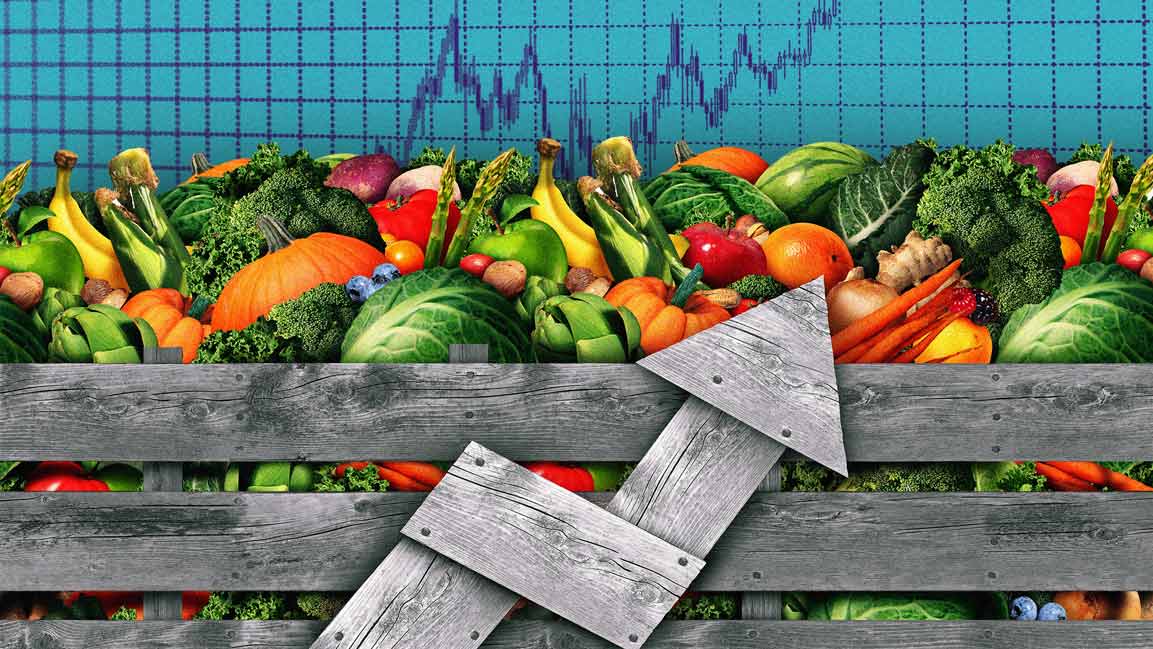Kogi, Lagos, Bayelsa pay more for food as inflation hits 24.08%
The headline inflation rate for the month of July 2023 increased to 24.08% compared to 22.79% recorded in June 2023, the National Bureau of Statistics (NBS) has stated. NBS, in a report, said the rise represented an increase of 1.29% points from the June 2023 headline inflation. The report stated that the increase in the […]

The headline inflation rate for the month of July 2023 increased to 24.08% compared to 22.79% recorded in June 2023, the National Bureau of Statistics (NBS) has stated.
NBS, in a report, said the rise represented an increase of 1.29% points from the June 2023 headline inflation.
The report stated that the increase in the headline index for July 2023 was attributed to an increase in contributions of some items in the basket of goods and services at the divisional level.
“These increases were witnessed in Food & Non-Alcoholic Beverages (12.47%), Housing, Water, Electricity, Gas & Other Fuel (4.03%), Clothing & Footwear (1.84%), Transport (1.57%), Furnishings & Household Equipment & Maintenance (1.21%), Education (0.95%) and Health (0.72%). Others are Miscellaneous Goods & Services (0.40%), Restaurants & Hotels (0.29%), Alcoholic Beverages, Tobacco & Kola (0.26%), Recreation & Culture (0.17%) and Communication (0.16%).”
Kogi gov’ship: Court reserves judgment in Adeyemi’s appeal
PHOTOS: Hoodlums Vandalise SDP campaign office in Kogi
Food inflation rose to 26.98 per cent
The report added that the food sub-index increased by 26.98% on a year-on-year basis, which was 4.97% points higher relative to the rate recorded in June 2022 (22.02%).
“The rise in food index on a year-on-year basis was caused by increases in prices of oil and fat, bread and cereals, fish, potatoes, yam and other tubers, fruits, meat, vegetable, milk, cheese, and eggs.”
“Similarly, the food inflation rate on a month-on-month basis, in July 2023, rose to 3.45%, which was 1.06% points higher compared to the rate recorded in June 2023 (2.40%).”
For all items less farm produce, it figures stood at 20.47% in July 2023 on a year-on-year basis.
It said this was driven by an increase in prices of Passenger Transport by Air, Passenger Transport by Road, Vehicle Spare parts, Medical Services, Maintenance and repair of personal transport equipment, etc.”
On a state level, analyses on a year-on-year basis, showed the highest increases in Kogi (34.53%), Lagos (32.52%) and Bayelsa (31.31%). While Jigawa (20.90%), Sokoto (21.63%) and Kebbi (22.45%) recorded the slowest rise in Food inflation during the month.
On a month-on-month basis, Food inflation for July 2023 was highest in Kogi (6.73%), Akwa Ibom (5.64%) and Bayelsa (4.59%), while Taraba (-0.21%), Jigawa (0.28%) and Yobe (0.90%) recorded the slowest food inflationary rate on a month-on-month basis.
Inflation induced by policies
Paul Alaje, a senior economist at SPM Professionals, said Nigeria is already in an inflationary environment while the new policies of the federal government inflamed inflation.
Alaje said policies like the removal of fuel subsidy and the naira unification were policies that aggravated inflation but last year, inflation was fueled by food scarcity.
“Last year, we had inflation due to food scarcity and so on. But we have now made policies that will induce inflation to a new high. So, when you compare the fact that the inflation is already high but instead of the government finding measures to reduce it, it brought on the new policies.”
While projecting that the figure for August would increase further, he advised the government not to continue the devaluation of the naira.
“If we devalue the naira as a strategy of unification, it will only make lives tougher for Nigerians and make people poorer. That is exactly what we are seeing. This is because we have not solved the real issue that affects inflation and exchange rate.”
He said instead of solving the real problem, the government is looking for an easy way out, hoping that those in speculation would reduce.
“What authorities do not understand is that some wicked people have taken speculation as a full-time business. Not until we are able to find a way to reduce the impact. No matter how much we devalue it, so long as some people are still making ends meet from it, it will continue to affect us.”
